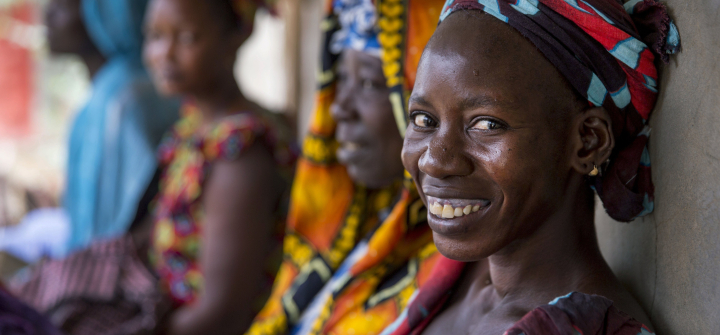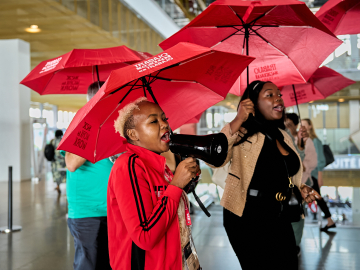Beijing+30: A New Generation Needed to Advance Women’s Rights
This year marks the 30th anniversary of the landmark Beijing Conference and the adoption of the Beijing Platform for Action, a historic document that operationalized previous global commitments to advancing women’s rights and gender equality.
In recent decades, the women’s movement and rights organizations have made remarkable strides in advancing gender equality and improving women’s lives. Notable achievements include:
- A +30% reduction in maternal mortality.
- Global recognition of gender-based violence (GBV) as a critical human rights issue, leading 162 countries to criminalize GBV.
- A significant increase in access to modern family planning methods among women aged 19-24 between 1995 and 2024, empowering them with greater reproductive autonomy and contributing to broader socio-economic development.
However, gender disparities in political representation remain. More than three-quarters of parliamentary seats worldwide are still occupied by men. And 70% of African youth surveyed say there are not enough female leaders and role models in their country.
Similarly, deep-seated inequalities persist in sexual and reproductive health, where 800 women lose their lives every day to preventable maternal causes. The situation is even more alarming for Black women and girls, who are up to 3X more likely to experience maternal mortality from preventable complications.
GBV continues to be a critical concern. One in three women has at least once experienced physical or sexual violence, often by an intimate partner. In Africa, 75% of youth surveyed are concerned about GBV in their country. In South Africa, the level of concern rises to 95%, with an estimated three women subjected to such violence every hour. These figures underscore the urgent need for sustained policy interventions and systemic reforms to address gender inequality in all its dimensions.
The recent 69th Commission on the Status of Women (CSW) assessed progress on gender equality and sexual and reproductive health and rights (SRHR). It was a critical discussion as the world contends with increasing concerns over population dynamics, often fueled by demographic anxieties. These concerns have contributed to an unprecedented wave of opposition to SRHR, frequently justified through cultural relativist arguments. Opponents of SRHR argue that certain rights, such as access to contraception and abortion, conflict with traditional, religious, or national values.
At present, two-thirds of countries are experiencing low fertility rates, while projections indicate that by 2050, half of the global population will be concentrated in just eight countries. In response, conservative ideologies have increasingly sought to curtail SRHR, particularly for women and marginalized communities, through state-controlled population policies and anti-rights rhetoric.
Coercive tactics like restricting access to contraception and criminalizing abortion undermine gender equality and economic progress. Evidence shows that empowering women through comprehensive SRHR policies, education, and economic opportunities leads to better health outcomes, lower fertility rates, and stronger economies. Every dollar invested in family planning and maternal health in developing countries yields an $8.40 return on investment, with potential economic benefits reaching $660 billion by 2050, if additional investments are made.
Instead of controlling women’s reproductive choices, nations should invest in voluntary, rights-based policies that promote informed decision-making.
Addressing women’s issues requires a multifaceted approach that acknowledges the intersectionality of gender with other social determinants such as race, economic status, disability, and geographic location.
Women are not a homogenous group, and their lived experiences differ vastly, necessitating policies and advocacy strategies that are inclusive and responsive to their unique challenges. Sustainable progress in gender equality also hinges on innovative funding mechanisms that move beyond traditional donor dependency, ensuring grassroots and advocacy initiatives have long-term financial resilience.
Equally important is the commitment to mentoring and empowering young women to take up the baton, fostering a new generation of leaders who will continue to challenge systemic barriers and drive transformative change for all women.
Consolata Chikoti is a lawyer and global health scholar from Tanzania with expertise in gender equality, sexual reproductive health, and human rights. She is an SRHR Research Consultant at the O’Neill Institute for National and Global Health Law at Georgetown University and a Women in Global Health Chapter Lead in Tanzania.
Join the 50,000+ subscribers in 170+ countries who rely on Global Health NOW summaries and exclusive articles for the latest public health news. Sign up for our free weekday newsletter, and please share the link with friends and colleagues.
A mobile clinical outreach team from Marie Stopes International, a specialized sexual reproductive health and family planning organization on a site visit to Laniar health center, in Senegal. August 14, 2014. Jonathan Torgovnik for The Hewlett Foundation/Reportage by Getty




